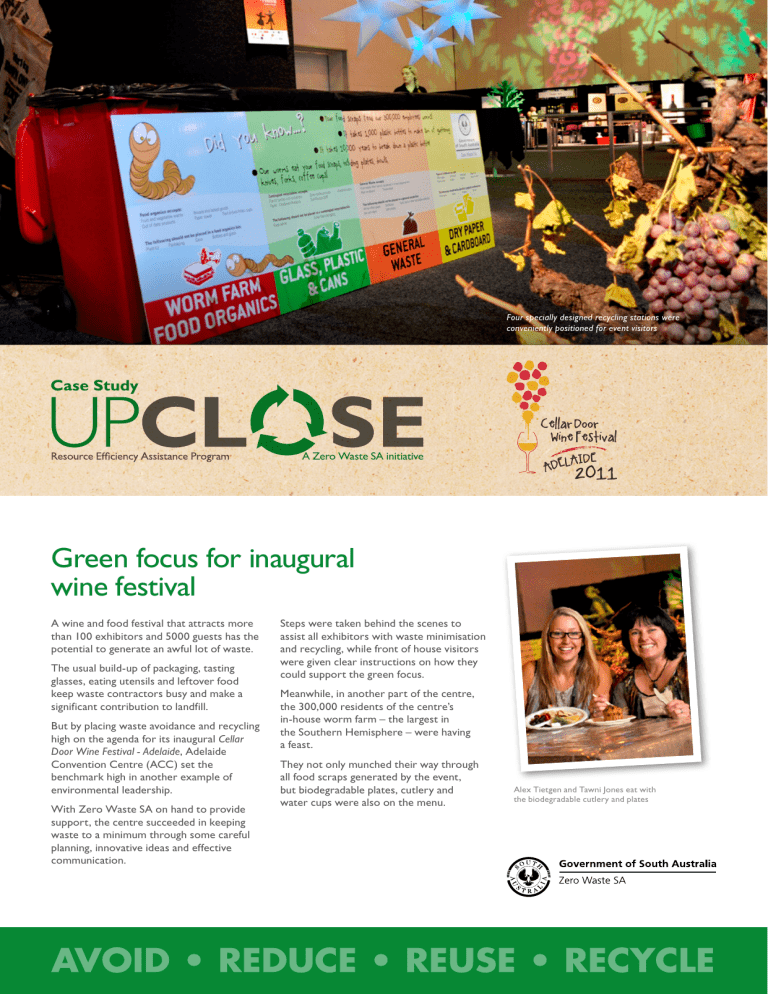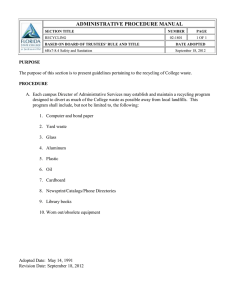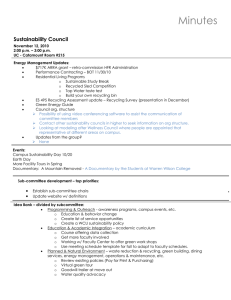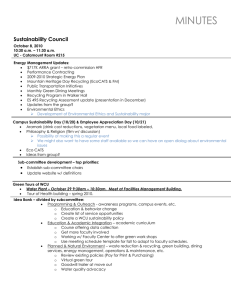CDWF case study - Adelaide Convention Centre

Four specially designed recycling stations were conveniently positioned for event visitors
A Zero Waste SA initiative
Green focus for inaugural wine festival
A wine and food festival that attracts more than 100 exhibitors and 5000 guests has the potential to generate an awful lot of waste.
The usual build-up of packaging, tasting glasses, eating utensils and leftover food keep waste contractors busy and make a significant contribution to landfill.
But by placing waste avoidance and recycling high on the agenda for its inaugural Cellar
Door Wine Festival - Adelaide, Adelaide
Convention Centre (ACC) set the benchmark high in another example of environmental leadership.
With Zero Waste SA on hand to provide support, the centre succeeded in keeping waste to a minimum through some careful planning, innovative ideas and effective communication.
Steps were taken behind the scenes to assist all exhibitors with waste minimisation and recycling, while front of house visitors were given clear instructions on how they could support the green focus.
Meanwhile, in another part of the centre, the 300,000 residents of the centre’s in-house worm farm – the largest in the Southern Hemisphere – were having a feast.
They not only munched their way through all food scraps generated by the event, but biodegradable plates, cutlery and water cups were also on the menu.
Alex Tietgen and Tawni Jones eat with the biodegradable cutlery and plates
Festival visitors were given a ‘passport’ which explained the green focus
“
The centre’s cleaners played a
“
waste streams and regularly checked for any contamination.
Alex Tietgen
Exhibitions Manager
Adelaide Convention Centre
WAR On PlASTiC
While the Adelaide Convention
Centre has a well-established environmental program, the individual efforts of staff members can still have a significant impact.
Watching an SBS documentary on the dire environmental legacy of plastic waste was a defining moment for
Exhibitions Manager Alex Tietgen and has influenced her priorities when organising events.
“For me plastic is now the enemy and i’m always on the search for more environmentally friendly alternatives,” says Alex. “That’s why using cornstarch plates and cutlery was such a great option.”
Sustainability objectives
Minimise the environmental footprint of the inaugural Cellar Door Wine Festival - Adelaide through innovative waste reduction and large-scale recycling.
Outcomes
Over the three days of the festival ACC’s waste management program handled an estimated:
• 0.78 tonnes of co-mingled recycling
• 10,800 litres of organic waste for the worm farm
• 10 bales of paper and cardboard
• contents of 12 x 120 litre spittoon bins buried in the gardens
• 1.44 tonnes of general waste to landfill
Zero Waste SA support
Adelaide Convention Centre is a member of the Zero Waste SA Resource Efficiency
Assistance Program. Support through REAP has included:
• Sustainability diagnostic, a softwarebased tool for assessing, benchmarking and managing sustainability within organisations
• Funding support for a waste review
• Development of a case study
Resource Efficiency
Assistance Program
The strong green focus during the Cellar
Door Wine Festival is another example of the leadership shown by the ACC in pursuing environmental best practice.
A wide-ranging sustainability program introduced in 2007 has been recognised in
Australia and internationally with a string of environmental awards.
As a member of Zero Waste SA’s Resource
Efficiency Assistance Program * the centre has been given support in incorporating sustainability as part of core business.
Most recently Zero Waste SA has been assisting with a comprehensive review of the centre’s waste and recycling requirements.
“We need a better insight into all the waste streams generated by the centre and during exhibitions to maximise the opportunities for recycling,” says Ms Tietgen.
“This information will help us identify the most appropriate waste contractor and to develop a contract that will best meet our recycling goals. Eventually we want to reach the stage where we are paid for some of these materials.”
* Visit www.zerowaste.sa.gov.au for the ACC REAP case study (www.zerowaste.sa.gov.au/at-work/reap)
Hollick’s Tim Lowe adds sawdust to the spittoon waste for disposal in the centre’s gardens
High visibility recycling
There was more than great South
Australian food and wine on show for the
5000 visitors who attended the Adelaide
Convention Centre’s inaugural Cellar Door
Wine Festival.
The waste recycling program was also highly visible.
The exhibition hall was transformed into different wine regions and a regional farmers market so people could effectively taste their way around the State.
And as people progressed through the trail they also passed four strategically placed, high profile recycling stations. Designed inhouse, the stations were clearly marked for:
• general waste
•
• glass and plastic paper and cardboard
• food waste and organics.
To make sure visitors were in no doubt which 240 litre bin to use, each one carried a list of acceptable items.
“The design of the bins incorporated an element of fun and we placed them in central locations so it was clear to people that we were serious about minimising waste,” says Exhibitions Manager
Alex Tietgen.
“Usually waste bins are tucked away off to the side somewhere, but we transformed them into a real feature.”
Green initiatives
The festival’s strong focus on sustainability was evident to visitors through various other initiatives:
Festival passport – All guests were given a ‘passport’ on arrival which highlighted event activities and listed the exhibitors.
Printed on 100% recycled paper, the passport also featured a page promoting the festival as a ‘Green Event’ with information listing some of the highlights and emphasising the focus on recycling.
Wine glass – Plastic tasting cups are sometimes a feature of such festivals.
To keep the waste down visitors were given their own wine glass which they could take home as a souvenir.
Plates and cutlery – A highlight of the sustainability program was the use of biodegradable cutlery, plates and water cups made from cornstarch * . Visitors were asked to place them in the organics bin along with scrap food for the centre’s worm farm.
Worm castings are mixed with paper by
ACC to produce rich compost.
Support for exhibitors
Efforts to minimise the event’s environmental footprint were underway well before the doors opened to the public.
With 107 different wineries and food companies involved, transporting goods to the centre had the potential to be logistically challenging and wasteful.
To avoid the problem of having multiple trucks queuing at the centre waiting to offload with engines running, a central depot was established at an offsite facility near the airport.
This allowed delivery to be better coordinated with just eight semi-trailers arriving at the ACC at designated times.
Other initiatives for exhibitors included:
Recycling – Areas were established behind the stalls where cardboard was flattened and given to the Scouts for fundraising, while paper was collected by
Veolia Environmental Services. Scout bins were also made available for collecting empty bottles.
Spittoons – Wine from spittoons was mixed with sawdust in holding bins and buried in the centre gardens to prevent it ending up as effluent.
Refrigeration – Exhibitors were given plastic ice containers to keep wines cool to cut down on refrigeration and excess energy use. Melted water from the containers was removed each night and used for watering the centre gardens.
* Traditional paper plates cannot be recycled because they become contaminated with food and are often coated with wax.
919 proprietor Jenny Semmler discusses the environmental benefits of lightweight bottles with Tawni Jones
Exhibitor feedback
A large wine festival with a low environmental impact was particularly appealing to Riverland winemaker 919.
The Berri-based producer has introduced various initiatives to minimise its ecological footprint, including lightweight bottles, waste and energy reduction, and organic and biodynamic practices in the vineyard.
“The wine sector is very aware of the importance of its green image so it was a bonus to be involved in an event that could demonstrate best environmental practice,” says 919 proprietor Jenny Semmler.
“As an exhibitor you want to focus on presenting your product in the best possible way and not be too worried on the day about back of house waste and recycling.
“The fact that the convention centre took the initiative and made that easy for us was excellent.”
About Adelaide
Convention Centre
Adelaide Convention Centre promotes
Adelaide as Australia’s ‘green’ conference centre and operates under the mantra
“Gold Service, Green Attitude”. The centre can accommodate up to 6500 banquet guests and offers 10,450 square metres of floor space for exhibitions, a plenary hall,
14 meeting rooms and an atrium.
“
Our goal is to make the Cellar Door
Wine Festival a zero waste event.
“
have placed us well on the way to achieving that goal.
Alex Tietgen
Exhibitions Manager
Adelaide Convention Centre www.adelaidecc.com.au
Tawni Jones
Senior Adviser, industry Sustainability
8204 1706 tawni.jones@zerowaste.sa.gov.au
About Zero Waste SA
Zero Waste SA is a South Australian
Government agency that advances improved waste management policies and the development of resource recovery and recycling. The Zero Waste SA Resource
Efficiency Assistance Program (REAP) advises and supports organisations to achieve sustainability goals in waste, water and energy.
John Blumson
Manager, industry Sustainability
8204 2043 john.blumson@zerowaste.sa.gov.au
www.zerowaste.sa.gov.au
Level 8, Statewide House
99 Gawler Place
Adelaide SA 5001 www.zerowaste.sa.gov.au
Published May 2011 • FIS 91102


